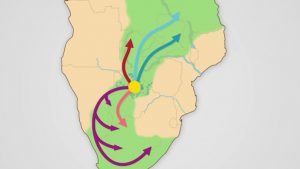
Where in Africa Are You from?
Although anthropologists know that modern humans (Homo sapiens) first appeared in Africa some 250,000 to 300,000 years ago, it is difficult to make a point estimate. This is because Homo sapiens fossils are found everywhere in Africa, and DNA samples are rather insufficient. The long-standing general belief is that we were born in East Africa, where the majority of the earlier fossils were found.
A study recently published in Nature added another spark to the already-controversial issue, claiming that all humanity was born in northern Botswana. Based on the analysis of mitochondrial DNA (mtDNA), which is inherited only from mother to daughter, the study suggests that we all come from a small group of Khoisan (Bushmen) hunter-gatherers who lived 200,000 years ago in the Okavango Delta and the Makgadikgadi region of Botswana
Blood samples were taken from 200 people living in hunter-gatherer groups, whose DNA has not been extensively studied, including groups in Namibia and South Africa. The mitochondrial DNA (mtDNA) from these samples were then compared to 1.000 other mtDNA samples, mostly from South Africa. Finally, all samples were related to each other on a family tree.
This new study focuses on a rare mtDNA strain called L0 (L-zero). This is the oldest mitochondrial lineage that has passed from mother to daughter, through many generations. Mutations may occur from time to time, but these are all associated with important evolutionary changes. The director of the study, Vanessa Hayes, became interested in L0 while working in the South African Genome Project, and she tracked the mutations in L0 backward to identify the periods when significant changes occurred.
Although Kalahari looks like a vast desert basin at the moment, it was once an enormous wetland, hosting the largest lake in Africa. Communities who lived in the region thrived in this fertile land steadily for almost 70,000 years. Around 130,000-110,000 years ago, the green corridors were opened in the northeast and southwest directions due to climate change, providing people a way to leave the region. This migration movement can be tracked in the L0 linage.

There are other studies supporting Hayes’ thesis. For example, a study published this year provides evidence suggesting a wave of migration from Botswana to East Africa, where different populations mixed with each other, playing an important role in the birth of a modern human.
Hayes has been criticized for investigating the origins of humanity by drawing conclusions based solely on the DNA of living people. Some people argue that she would have reached quite different conclusions if she traced the evolution of Y chromosome passing from fathers or nuclear genes inherited from both parents. It is also true that our Neanderthal genes are only found in the nuclear DNA, and entirely absent in the mitochondrial genome.
Besides, there is the possibility that our female ancestors traced through L0 may have migrated from another region.
“Populations move and mix so much over the millennia”, says Pontus Skoglund of the Francis Crick Institute in London, “that studying DNA from living humans is very limited when it comes to reconstructing what happened to populations 70,000 to 200,000 years ago. For that, you need ancient DNA or well-dated fossils”.
It seems that what genetics tells about the origin of humanity, rather than providing an answer to this question, reveals how complex this story actually is.
REFERENCES
- 1. https://www.scientificamerican.com/article/lush-okavango-delta-pinpointed-as-ancestral-homeland-of-all-living-humans/?utm_source=newsletter&utm_medium=email&utm_campaign=sciences&utm_content=link&utm_term=2019-11-01_featured-this-
- 2. https://www.sciencemag.org/news/2019/10/experts-question-study-claiming-pinpoint-birthplace-all-humans?utm_campaign=news_weekly_2019-11-01&et_rid=527298681&et_cid=3055519
- 3. https://www.bbc.com/news/science-environment-50210701
- 4. https://www.nature.com/articles/s41467-019-11213-w
